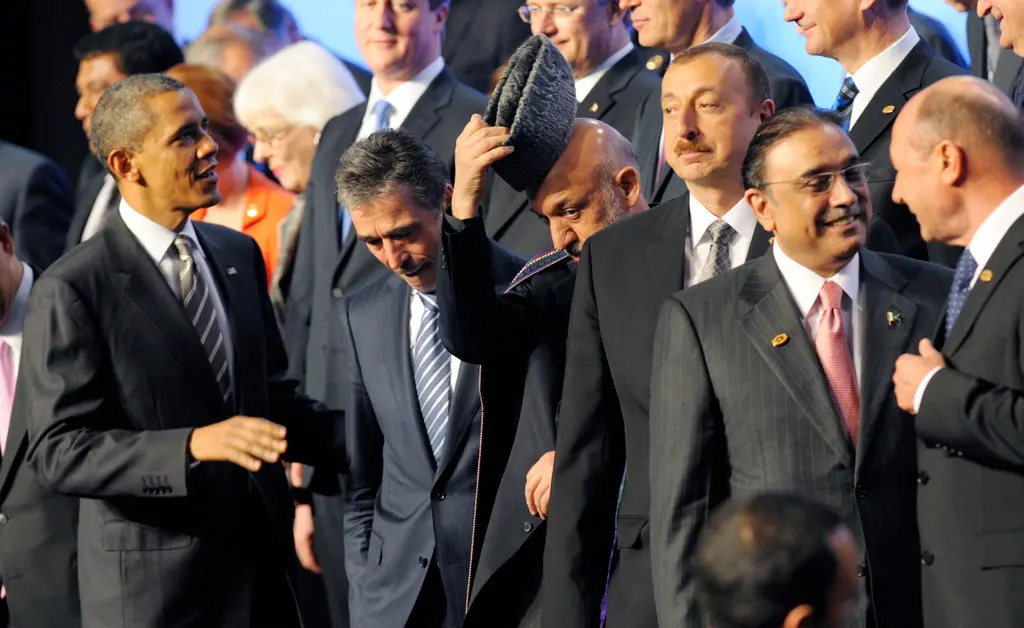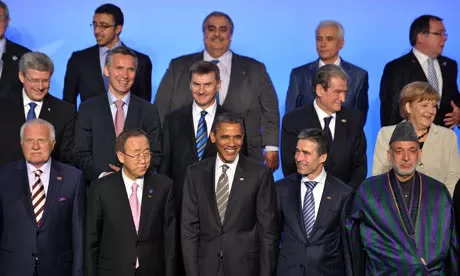Trying to muddle way out of another unpopular war and loath to concede defeat, US and NATO have been racing against time to build an Afghan army able to fend for itself after 130,000 US and ISAF troops pull out in 2014. The final transition phase, involving handing over responsibility for provinces and districts to Afghan authorities would start from “mid-2013”, NATO Secretary-General Anders Fogh said this involved handing over lead responsibility for provinces and districts to Afghan authorities. A number of areas and towns have already been handed over since the transition started a year ago. Incidents of Afghan soldiers turning on NATO troops cause apprehension of increased Taliban infiltration of the Afghan police and army.
NATO initially planned to expand Afghan Security Forces to over 350,000. Defining the 2014 exit strategy the Chicago summit set the size and scope after 2014 to be much smaller, roughly 230,000 troops. Without scaling down the future security needs, it simply reflected prevailing economic realities in an era of austerity budgets and defense cutbacks. US and NATO require US $4.1 billion a year bill to maintain the Afghan military, far lesser than the cost of maintaining foreign forces in Afghanistan and also, and more importantly, easier for economically suffering and war-weary US and European publics to sustain.
In keeping with his campaign pledge, incoming French President Francois Hollande said France would withdraw its own forces by end 2012. Alongwith Britain, Germany and Italy, France is among the top five largest troop-contributing nations with about 3,600 soldiers, dwarfed by the 90,000-strong U.S. force. The 9500 strong British forces in Afghanistan since the US-led invasion in 2001 will reduce by 500 soldiers this year, 200 members of UK’s special forces will stay on after 2014 to help combat terrorism in Afghanistan.
Afghanistan’s largest patron, the US is supposed to share about 25% of the cost after 2014 in support of the present Afghan regime for at least a decade (or more) but could well conceivably bear more than half the cost. The recent Obama and Karzai strategic partnership covers everything from security to economic development, to building a functional Afghan government. US special operations forces will have to stay to “mentor the Afghan National Security Force,” says Marine Corps Maj. Gen. John Toolan, who commanded NATO forces in Afghanistan’s volatile southwest. US gunships and air-to-ground assault planes will continue supporting ground forces, the fledgling Afghan air force which in 2015 will still be unable to do so. US continue also maintaining a fleet of intelligence-gathering and surveillance aircraft, Heritage Foundation’s Lisa Curtis claims, “It spells out an important U.S. red line to the Taliban, who have long called for expelling all foreign forces from the country.” All said and done, will the Afghan Army fight? With track record over centuries of deserting on masse to whosoever controls Kabul and the treasury, it did not fight for the Soviets against the Mujhahiden and neither for US and NATO against the Taliban.

Despite being subjected to constant badmouthing by motivated sections of the world community blind to Pakistan’s sacrifices, in a damned if you will, damned if you won’t situation, President Zardari faced studied but polite cold-shouldering in Chicago. On the one hand are the economic and geo-political considerations of far reaching consequences for the destiny of the nation, on the other an enraged populace burning with anger against the drone strikes and the US failure to render an apology over Salala. A predator nation that has lived off the Indus Valley for centuries, Afghanistan will continue to live off Pakistan for centuries more. Commenting on Abid Latif Sindhu’s article “Necessary Roughness – End Game in Afghanistan”, Brig Usman Khalid concludes (1) The endgame will effect the world balance of power because Pakistan has a crucial role to play bordering China, Central Asia and the Western part of the Arabian sea that control two choke points – Gulfs of Aden and Hormuz and (2) Pakistan has shown ‘necessary roughness’ which is a pre-requisite for playing its role in the new narrative that would unfold after the exit of NATO from Afghanistan in 2014. Brig Usman Khalid further notes, “It is in Pakistan’s interest to facilitate the withdrawal of NATO forces by the end of 2014 and logistic support until then. The re-opening of the supply line to Afghanistan is no longer an issue. Pakistan does not and cannot support the overall design of USA which is now being made in consultation with India. Pakistan-US relations will move along a rough and bumpy road. If Pakistan maintains its strategic co-operation with Saudi Arabia and warm relations with China , the cost of travelling this bumpy road would be bearable and diplomatic isolation avoided”, unquote. The NATO supply line through Pakistan needs resolution but will have emotional ramifications among a populace no longer patient with putting issues on a backburner.
The presence of American ‘experts’ after 2014 with US bases operational at Bagram, Kandahar and Kabul has made the endgame more complex. According to Sindhu, “Pakistan has just shown necessary roughness while dealing with USA in retaliation for its bashing; it was never an act of defiance. It is precisely what is required in any relationship, may it be one between husband and wife or Hillary’s favorite mother-in-law analogy. So it should be taken in the right context. Pakistan is not a rentier state; the state policy could be lop-sided but it does exist. It is both a victim and the player of the new great game with a status of the regional middle kingdom. Afghanistan endgame is being played by increasing the numbers of players in its final hour; this has made the phenomenon global in nature and multi-dimensional in its texture”.
Sindhu asks whether Pakistan can be ignored with its unique connectivity matrix when Pakistan is fighting an extended insurgency in all of the tribal areas? In essence, he says “globalism has come face to face with tribalism, one using technology as the main driver and later using the simplicity as the sin-qua-non for its existence and survival. International conferences, moots and summits without reality checks would be a futile exercise perpetuating the Afghan ordeal. Pakistan, Afghanistan and USA have to reach an operational consensus respecting each other’s sensitivities.“ unquote. Sindhu left out an inconvenient truth which the west well knows, the best bet against future conflict is not going to be the well-funded ceremonials of the Afghan Army but the motivated battle-hardened disciplined soldiers of the Pakistan Army.
The Chicago Summit recognized the hometruth about Pakistan’s being not only critical but central for an Afghan solution, to quote Rasmussen, “there can be no large drawdown of troops from Afghanistan without Pakistan’s help”. President Obama said “It is in our interest to see a successful, stable Pakistan and it is in Pakistan’s interest to have stable relationship with us.” Meeting Zardari briefly he expressed the desire to stay engaged despite differences, “the US did not want Pakistan to be “consumed by its own extremism”.
Beyond Chicago, Pakistan can only hope it will not be consumed by western extreme views which fail to recognize the relevance of the Taliban ground reality!
Courtesy: The News




